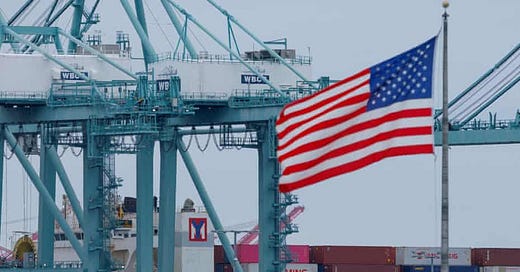Why Didn’t Congress?
A Trade Court Halted Trump's Tariffs. Why Did Congress Not Act?
This afternoon, the United States Court of Appeals issued an administrative stay on the ruling from the Court of International Trade while it considers an emergency appeal from the Trump administration.
The legislation designed to curtail Trump’s trade war chaos, much like the judicial entity that ultimately applied it, was concealed in plain sight. In 1977, Congress enacted the International Emergency Economic Powers Act, or IEEPA. Although the name suggests it was meant to enhance the president’s emergency powers, its true purpose was to restrict them. The IEEPA was established to reduce the executive branch’s excessive dependence on the 1917 Trading With the Enemy Act, a wartime law that, as modified in 1933, permitted President Franklin Roosevelt to assert expanded economic powers in peacetime merely by declaring a national emergency.
The economic climate in 1933 was undoubtedly an emergency. However, during the early 1970s, Congress realized that no president had ever rescinded that decades-old emergency. Consequently, presidents continued to wield the various emergency powers granted by the 1917 law, including the imposition of tariffs at their discretion. A Senate Special Committee on the Termination of the National Emergency was formed, led by liberal Senators Frank Church and Charles Mathias. One outcome was a 1976 law that restricted the application of the 1917 law to wartime. The IEEPA was another significant result, as it curtailed the president’s emergency powers during peacetime and authorized Congress to obstruct, through joint resolution, any tariff or other emergency measures claimed under the 1977 legislation.
None of this should have necessitated the intervention of this court to rectify the situation. The fabricated national emergency that Trump devised as a rationale for his revenue-seeking tariffs should have been resolved through a congressional joint resolution. Prior to Trump, no president had ever asserted IEEPA authority to impose a tariff. However, the current Republican-controlled Congress represents James Madison’s worst nightmare, paralyzed by fear of a vengeful chief executive, thus failing to restrain his power.
In April, the Senate did pass one resolution, with a vote of 51–48, to block Trump’s absurd 25 percent "fentanyl tariff" on Canada, and later that month, the Senate narrowly failed to pass a second resolution, with a tie of 49–49, to block Trump’s "Liberation Day" tariffs. Under IEEPA, such resolutions are considered "privileged," meaning the majority party cannot prevent them from being brought to the floor. Nevertheless, the House Rules Committee, led by the reactionary Virginia Foxx, inserted language into a March spending bill that obstructed House consideration of the Canada resolution.
While Congress hesitated, 12 state attorneys general and the Liberty Justice Center, a Texas nonprofit representing five small businesses reliant on imports, initiated a lawsuit in the United States Court of International Trade. In its summary judgment, the court observed that the IEEPA stipulates its emergency powers may only be invoked "to address an unusual and extraordinary threat"—a claim Trump failed to substantiate—and that "any interpretation of IEEPA that grants unlimited tariff authority to the president is unconstitutional."
The ruling does not invalidate all of Trump’s tariffs, as not all of them are based on the IEEPA. However, it does terminate the Liberation Day tariffs—which, despite appearing to fluctuate frequently, have consistently included a 10 percent universal tariff—as well as the fentanyl tariffs imposed on Canada, Mexico, and China. Notably, two of the three judges who voted against the tariffs (out of a total of five judges) were appointed by Republicans, and one of them (Timothy Reif) was appointed by Trump himself in 2019. This significantly undermines a statement from a White House spokesman asserting that "it is not for unelected judges to decide how to properly address a national emergency" and Stephen Miller’s assertion that "we are living under a judicial tyranny."
As reported by CNBC, Trump may seek emergency relief from the Supreme Court regarding the Court of International Trade’s decision "as soon as Friday." One might question whether even the most conservative members of the Supreme Court are beginning to feel fatigued by the need to oversee Trump’s actions. During his first term, Trump submitted 41 emergency appeals to the high court, as noted by Georgetown Law professor Stephen Vladeck. This figure exceeds five times the number of emergency appeals filed by George W. Bush and Barack Obama during their combined four terms. It is likely that Trump will surpass that record before the year concludes. The high court certainly has numerous other matters to attend to.
Trump tried to twist emergency powers into a personal trade weapon, slapping tariffs on allies like Canada under fake national crises. But the courts yes, even judges he appointed just reminded him that America is a democracy, not a dictatorship. Congress failed to act, but the rule of law didn’t. This is what fighting authoritarian overreach looks like.




